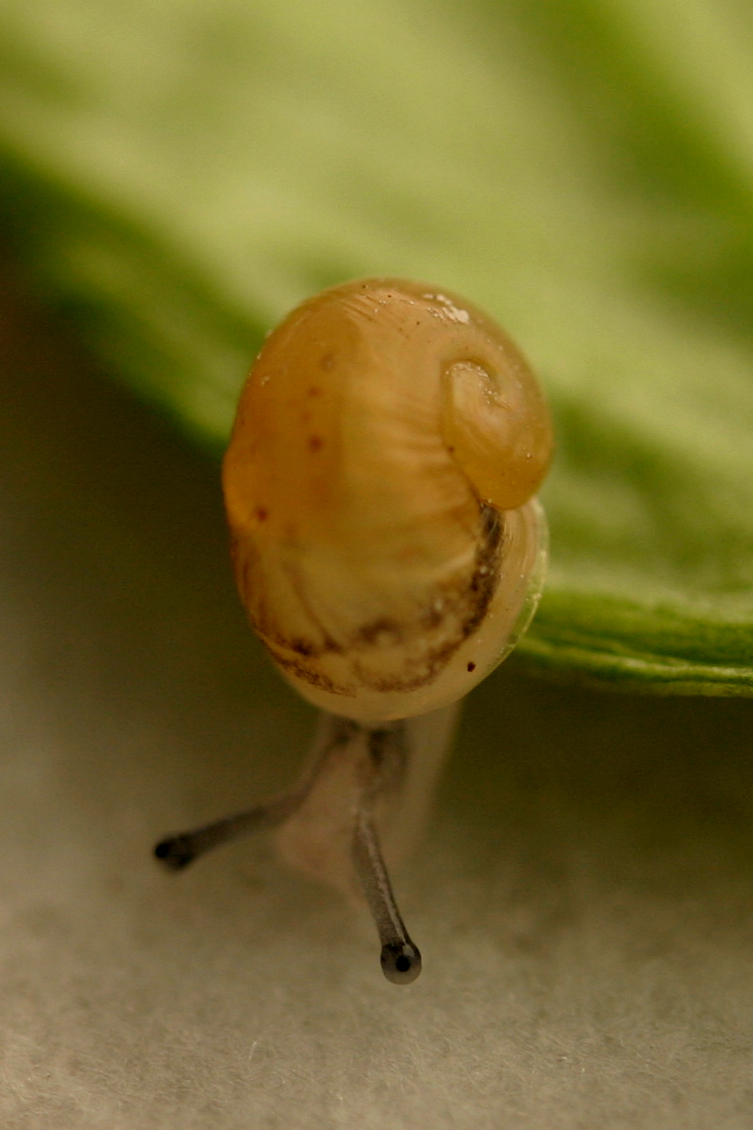Tuesday, 30 March 2021
A Scientist from the University of Nottingham, who helped a one in a million left-coiling garden snail called Jeremy find a mate, has finally raised a first-ever lefty snail in the lab, and is hoping the public can help him find another.
Evolutionary geneticist Dr Angus Davison, from the School of Life Sciences at the University, discovered Jeremy, the brown garden snail with a rare left-coiling shell, in October 2016.
Dr Davison hoped to use the offspring from Jeremy to study the genetics of this condition, because his previous work on snails had given insight into understanding body asymmetry in other animals, including humans.
 Jeremy Junior
Jeremy Junior
Another left-coiling snail had to be found first because as well as a mirror-imaged shell Jeremy had genitals on the opposite side, making it very difficult for the snail to mate with normal snails.
Dr Davison launched a worldwide hunt to find a mate for Jeremy. The lonely lefty-snail soon became a global sensation and internet ‘shellebrity’, with more than 1,000 news, radio, television and science articles appearing across the globe.
After initially finding two other lefty snails with the help of the public appeal, Dr Davison has been hard at work ever since breeding snails to try to get more lefties and to understand what it is that makes them grow up as a mirror image to all other garden snails.
“After hatching around 10,000 baby snails I had almost given up hope of ever finding and raising a lefty snail, so was really delighted to finally find one,” said Dr Davison.
“Our previous work – which was only possible because of the public’s help in finding other rare lefties – helped explain why they are so rare. An accident in the first few hours of the snail’s life means that the embryo cells just sometimes twist anti-clockwise rather than clockwise, ultimately producing a snail with an anticlockwise shell, rather than the normal clockwise shell.
 Dr Angus Davison
Dr Angus Davison
Dr Davison adds: “The snails that I now have in the lab regularly – but still rarely – produce lefty offspring, implying an inherited condition. I suspect that Jeremy and the French snails have a version of a gene which increases the tendency for a reverse twist to occur. My ambition is to identify this ‘Jeremy’ gene. As it is likely that the same gene is also present in our own bodies, identifying it in snails could contribute to understanding our own body asymmetry.”
The tiny new born lefty snail is currently being kept in the University’s snail breeding facility, with a view to raising – or finding – a mate. If anybody does come across another lefty garden snail then Dr Davison requests that they get in touch with him, to arrange for the snails to meet-up - don’t be sluggish!
Story credits
More information is available from Dr Angus Davison from the School of Life Sciences at the University of Nottingham at angus.davison@nottingham.ac.uk
Notes to editors:
About the University of Nottingham
Ranked 32 in Europe and 16th in the UK by the QS World University Rankings: Europe 2024, the University of Nottingham is a founding member of the Russell Group of research-intensive universities. Studying at the University of Nottingham is a life-changing experience, and we pride ourselves on unlocking the potential of our students. We have a pioneering spirit, expressed in the vision of our founder Sir Jesse Boot, which has seen us lead the way in establishing campuses in China and Malaysia - part of a globally connected network of education, research and industrial engagement.
Nottingham was crowned Sports University of the Year by The Times and Sunday Times Good University Guide 2024 – the third time it has been given the honour since 2018 – and by the Daily Mail University Guide 2024.
The university is among the best universities in the UK for the strength of our research, positioned seventh for research power in the UK according to REF 2021. The birthplace of discoveries such as MRI and ibuprofen, our innovations transform lives and tackle global problems such as sustainable food supplies, ending modern slavery, developing greener transport, and reducing reliance on fossil fuels.
The university is a major employer and industry partner - locally and globally - and our graduates are the second most targeted by the UK's top employers, according to The Graduate Market in 2022 report by High Fliers Research.
We lead the Universities for Nottingham initiative, in partnership with Nottingham Trent University, a pioneering collaboration between the city’s two world-class institutions to improve levels of prosperity, opportunity, sustainability, health and wellbeing for residents in the city and region we are proud to call home.
More news…